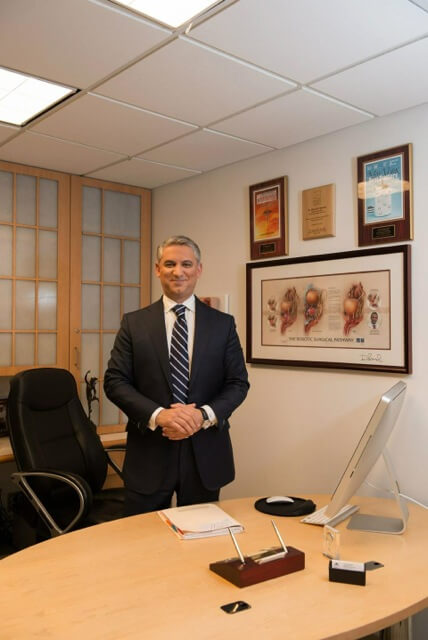Dr David B Samadi Nyc Prostate Cancer Surgeon

The diagnosis of prostate cancer can be a life-altering moment, filled with uncertainty and the pressing need for expert guidance. In New York City, one name frequently emerges in discussions surrounding this complex disease: Dr. David B. Samadi. He is known for his surgical skill and robotic techniques.
This article delves into the career of Dr. Samadi, exploring his methods, reputation, and the evolving landscape of prostate cancer treatment. We will examine his approach to robotic surgery, the perspectives of his patients, and the broader debates surrounding prostate cancer screening and treatment options. The aim is to provide a balanced and informative overview of Dr. Samadi's work within the context of modern urology.
Early Career and Training
Dr. David B. Samadi's journey in medicine began with his medical degree from Stony Brook University School of Medicine. He went on to complete his residency in urology at Montefiore Medical Center/Albert Einstein College of Medicine. Further training included a fellowship in oncology at Memorial Sloan Kettering Cancer Center and a fellowship in robotic surgery in France.
This extensive training laid the foundation for his expertise in both traditional and advanced surgical techniques. He quickly adopted robotic surgery as a preferred method. This approach allowed for greater precision and potentially reduced recovery times for his patients.
Robotic Surgery and the Samadi Method
Dr. Samadi is a proponent of robotic-assisted laparoscopic prostatectomy, a minimally invasive surgical procedure for removing the prostate gland. He often emphasizes the advantages of this technique over traditional open surgery, citing benefits such as smaller incisions, less pain, and faster recovery. He has branded his particular approach the "Samadi Modified Advanced Robotic Technique (SMART)."
The SMART technique is described as a refinement of the standard robotic prostatectomy. It emphasizes nerve-sparing techniques to preserve urinary continence and sexual function, two common concerns for men undergoing prostate cancer surgery. The effectiveness and long-term outcomes of the SMART technique are matters of ongoing discussion within the urological community.
Patient Perspectives and Testimonials
Patient testimonials often play a significant role in shaping perceptions of medical professionals. Dr. Samadi's website and other online platforms feature numerous accounts from patients praising his surgical skills and compassionate care. These stories frequently highlight successful outcomes and improved quality of life following surgery.
However, it's important to acknowledge that patient testimonials are inherently subjective and may not represent the full spectrum of experiences. Potential patients should consult with multiple medical professionals. They should carefully weigh the potential benefits and risks of any treatment option.
Controversies and Criticisms
Like many prominent figures in medicine, Dr. Samadi has faced scrutiny and criticism. Some concerns have been raised regarding the marketing of specific surgical techniques. There are also questions about the long-term efficacy compared to other well-established surgical methods.
Some medical professionals advocate for a more conservative approach to prostate cancer treatment, particularly for slow-growing or low-risk tumors. This approach includes active surveillance, which involves closely monitoring the cancer without immediate intervention. This debate highlights the complexity of prostate cancer management and the importance of individualized treatment plans.
Prostate Cancer Screening and Diagnosis
The role of prostate-specific antigen (PSA) screening in detecting prostate cancer remains a subject of debate. While PSA testing can help identify cancer early, it can also lead to overdiagnosis and overtreatment of clinically insignificant tumors. The American Cancer Society and other organizations offer guidelines on PSA screening. These are based on age, risk factors, and individual preferences.
The diagnosis of prostate cancer typically involves a combination of PSA testing, digital rectal exams, and prostate biopsies. Advances in imaging techniques, such as MRI, are also improving the accuracy of diagnosis and helping to differentiate between aggressive and less aggressive forms of the disease. These developments allows more tailored treatments.
The Evolving Landscape of Prostate Cancer Treatment
Prostate cancer treatment has evolved significantly in recent years. Beyond surgery and radiation therapy, new therapies such as targeted therapies and immunotherapies are showing promise for certain patients. These advanced treatments offer additional options for men with advanced or recurrent prostate cancer.
The field of urology is constantly evolving with new technologies and treatment approaches. Staying informed about the latest advancements and consulting with a multidisciplinary team of specialists is crucial for making informed decisions about prostate cancer care. Patients are increasingly encouraged to actively participate in their treatment planning process.
Dr. Samadi's Current Practice and Impact
Dr. Samadi continues to practice in New York City, focusing on robotic prostate surgery and other urological procedures. His prominence in the field has made him a sought-after surgeon. His visibility has also contributed to raising awareness about prostate cancer.
Ultimately, the choice of treatment for prostate cancer is a personal one. It should be made in consultation with qualified medical professionals after careful consideration of the potential benefits, risks, and side effects of each option. It is important to do research and seek expert advice.
Looking Ahead
The future of prostate cancer treatment is likely to involve even more personalized and targeted approaches. Advancements in genomics and molecular profiling are paving the way for tailored therapies that address the specific characteristics of each patient's cancer. Early detection and prevention strategies will also continue to be refined.
As research continues, and new treatments are developed, the hope is that men facing a prostate cancer diagnosis will have access to increasingly effective and less invasive options. The ongoing dialogue within the medical community, combined with informed patient decision-making, will be essential for improving outcomes and quality of life for those affected by this disease.
Disclaimer: This article is for informational purposes only and does not constitute medical advice. Always consult with a qualified healthcare professional for any health concerns or before making any decisions related to your health or treatment.













/sc-assets/prd/practices/99c04945-9b3a-4960-9a65-fc3f3b63ea24/68.jpg)




